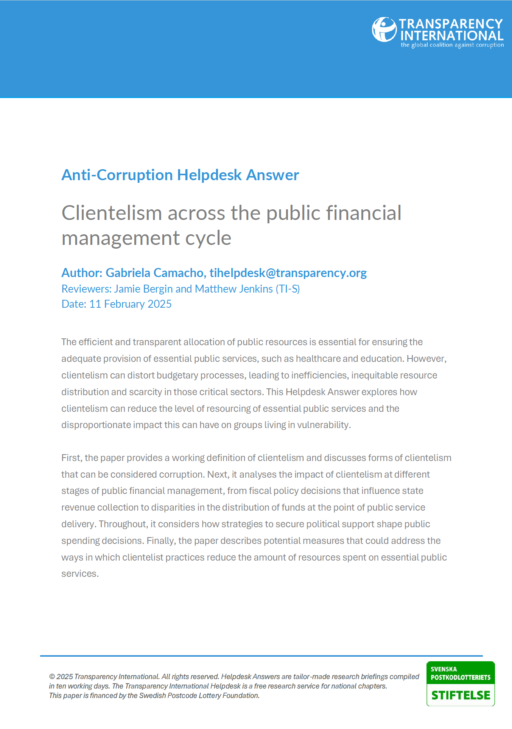
This Anti-Corruption Helpdesk brief was produced in response to a query from a Transparency International chapter. The Anti-Corruption Helpdesk is operated by Transparency International. The project is supported by The Swedish Postcode Lottery Foundation.
Query
What impact does clientelism have on the resourcing of essential public services?
Summary
The efficient and transparent allocation of public resources is essential for ensuring the adequate provision of essential public services, such as healthcare and education. However, clientelism can distort budgetary processes, leading to inefficiencies, inequitable resource distribution and scarcity in those critical sectors. This Helpdesk Answer explores how clientelism can reduce the level of resourcing of essential public services and the disproportionate impact this can have on groups living in vulnerability.
First, the paper provides a working definition of clientelism and discusses forms of clientelism that can be considered corruption. Next, it analyses the impact of clientelism at different stages of public financial management, from fiscal policy decisions that influence state revenue collection to disparities in the distribution of funds at the point of public service delivery. Throughout, it considers how strategies to secure political support shape public spending decisions. Finally, the paper describes potential measures that could address the ways in which clientelist practices reduce the amount of resources spent on essential public services.
Main Points
- For the purposes of this Helpdesk Answer, clientelism is understood as the discretionary provision of private benefits by government officials and politicians (who control public resources) to specific groups of citizens in exchange for political support (Bardhan 2022) in the context of electoral democracies.
- This is a useful lens through which to examine the distorting effects of patron-client relationships on the resourcing of essential public services, as the quid pro quo exchange of private benefits for political support could partly explain why public service provision to less powerful population groups might be neglected.
- The key distinction between clientelism and other strategies for securing political support in electoral democracies is that benefits are granted solely in exchange for political backing, rather than according to need or public interest, and these benefits can be withdrawn at any time if that support is no longer provided.
- Relationships between patrons and clients can be corrupting, in the sense that once a patron assumes public office, the ties that bind them to their clients may incentivise them to exercise undue influence over the allocation of public resources or even perpetrate acts of corruption to generate funds to buy political support from clients and cronies.
- Clientelism can be described as corruption when public officials abuse the power entrusted to them to allocate state resources in the public interest to instead divert these resources to their political clients as a means of promoting their own interests, which could include political survival and advancement.
- Much of the academic literature on clientelism focuses on its mechanics rather than its consequences. Nonetheless, some of its possible ramifications can be inferred, such as how clientelism can reduce the volume of public resources used to fund essential public services or distort the allocation of these resources in favour of particular groups. Clientelism can lead to distortions at different stages of the public financial management cycle.
- At the resource mobilisation stage, clientelism may encourage decision-makers to adopt fiscal policies that serve the interests of special interest groups, such as tax breaks for certain population groups.
- At the resource allocation stage, clientelism may direct public spending towards sectors and industries more conducive to corrupt practices of self-enrichment, to the detriment of the public interest. Leaders seeking to shore up their sources of political support may allocate considerable public funds to areas like defence or construction in which their allies are better able to extract illicit wealth through rent-seeking, kickbacks, lucrative public contracts and government jobs.
- Notably, in polities characterised by extensive clientelism, patterns of resource allocation are likely to be highly discretionary, allowing political leaders to respond adroitly to the demands of emerging political constituencies. The need of those in power to secure the support of their political clientele in this manner can affect the resourcing of universal public goods, such as reducing budgets allocated to healthcare and education.
- Clientelist practices at the resource distribution stage can result in essential public services for regions or population groups with strong political connections being better funded relative to services provided to less powerful groups.
- Reducing political clientelism requires combining administrative reforms, transparency initiatives, public awareness campaigns and institutional strengthening. By limiting discretion over resource allocation, increasing public oversight and reducing economic vulnerability, policymakers can create conditions that make clientelist practices less attractive and foster a more programmatic style of politics and ultimately a more equitable political settlement.
Authors
Gabriela Camacho
Reviewers
Jamie Bergin and Matthew Jenkins (TI-S)
Date
04/04/2025

